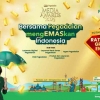Preface
This paper is prepared as part of the requirements for the Research Methodology in Management course, based on lecture notes and summarized materials. The global development of the academic world shows a dynamic landscape of research with diverse approaches, ranging from quantitative, qualitative, to mixed methods, which are increasingly relevant in the era of big data and artificial intelligence. However, research conditions in Indonesia are still marked by low methodological literacy, the dominance of descriptive studies, and the tendency to treat research merely as an academic requirement. Through the paper entitled “Tracing the Differences Between Qualitative and Quantitative Research in the Academic World”, it is expected that a more comprehensive understanding will emerge regarding the nature of quantitative and qualitative research, their distinctive characteristics, and the relevance of both in addressing the challenges of education and research. Hopefully, this writing can provide benefits for both the author and the readers, especially students, to be able to select and apply research methodologies appropriately according to the academic problems faced.
First, the essence of quantitative research. Quantitative research is objective, systematic, and measurable, based on a positivistic paradigm. This research emphasizes variable measurement, hypothesis testing, and the analysis of numerical data that can be generalized. The results of quantitative research are usually analyzed using statistical techniques, making it possible to clearly demonstrate cause-and-effect relationships. Therefore, this approach is often used in experimental research, surveys, or educational policy evaluations.
Second, the essence of qualitative research. Qualitative research is oriented toward understanding meaning, processes, and in-depth interpretations of social phenomena. The researcher acts as the main instrument, directly engaging in the field to explore experiences, interactions, and dynamics. Data collection techniques include interviews, observations, and document analysis, producing narrative data. The main purpose is not generalization but rather building a contextual and comprehensive understanding of complex realities.
Third, a comparison between quantitative and qualitative research. The differences between the two are clearly seen in their paradigms, data, analysis, and research objectives. Quantitative research emphasizes objectivity, measurable variables, and numerical data to produce results that can be statistically tested. In contrast, qualitative research emphasizes subjectivity, social construction, and narrative data that describe the meaning of phenomena. Quantitative research excels in producing generalizations, while qualitative research excels in providing in-depth understanding. These differences make it essential to choose the method according to the research objectives.
Fourth, the potential of mixed methods. Mixed methods emerge as a solution to overcome the limitations of each approach. This method combines the strengths of quantitative research in measuring and generalizing data with the strengths of qualitative research in providing contextual understanding. Through the integration of both approaches, researchers can gain a more comprehensive, valid, and meaningful picture of research. Mixed methods are highly relevant for addressing complex academic phenomena, where numerical data alone is insufficient, and in-depth understanding is also required.
Summary
The differences between qualitative and quantitative research must be deeply understood since both have distinct characteristics, objectives, and strengths. Quantitative research excels in objectively testing hypotheses, while qualitative research excels in understanding contextual meaning. Through mixed methods, researchers can combine both approaches to produce more comprehensive, valid, and relevant research in addressing the increasingly complex challenges of the academic world.
This paper is excerpted from the Teaching Module of the Research Methodology in Management course, Part 4, by Prof. Dr. H. A Rusdiana, MM
(https://digilib.uinsgd.ac.id/id/eprint/121673)







